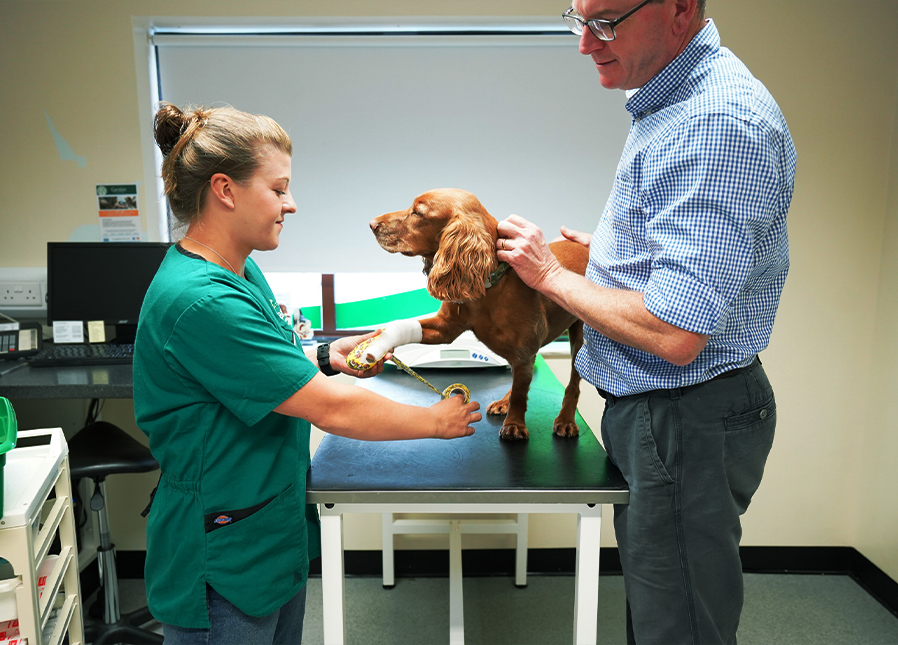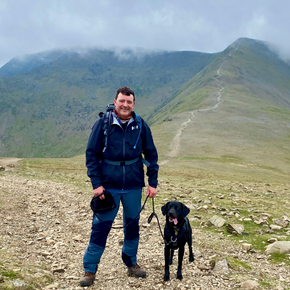
Are you planning on starting 2024 with a holiday? If so, good on you! If you plan to take your dog with you, then read on for our top tips on how to plan for your holiday.
Not taking your dog on holiday with you? No problem – download our list of questions to ask kennels whilst you research your dog’s temporary accommodation.
Download our kennel research guide
Deciding on your destination
You need to make sure your chosen destination and accommodation have plenty of dog-friendly spaces and activities to keep them happy. Popular staycation holiday choices in the UK are log cabins or pet-friendly cottages. Some areas will only allow dogs on the beach during certain months so researching ahead will help you plan your holiday. This research can also help you work out whether your dog could need extra training or socialisation ahead of your trip.
Transport options
If you are planning on travelling abroad, it is essential that you start planning your pet’s travel arrangements as early as possible. There will be animal health certificates and often vaccines and other health checks that need to be completed ahead of your holiday. These will be affected by time limits – learn more about pet travel.
If you are planning a staycation in the UK, make sure your chosen transport is suitable for your dog and the holiday you’ve chosen. More remote destinations will need car transport, which could be an issue if your dog becomes car sick. Trains and ferries may be a necessary part of the journey to your holiday destination – how would your dog cope with these?
Protect your pet
Before you leave for your holiday, ensure you have researched local vets near your destination just in case your dog requires veterinary treatment whilst away. You also need to make sure your pet’s microchip and collar ID tag have the most up-to-date contact details recorded. If you become separated whilst away, it is essential that a veterinary professional/animal shelter can get hold of you.
If you are holidaying abroad, keep your dog’s vaccine certificates, clinical history, and their animal health certificates to hand. To request a copy of your dog’s clinical history, contact our reception team.
It’s also worth checking that your pet insurance policy covers your dog for unexpected veterinary expenses, in case emergency veterinary treatment is needed, also if going abroad.
Essentials to pack for your dog
Remember to pack your dog’s food, treats, feed/water bowls, medication, collar, lead and harness, toys, bedding, grooming equipment, shampoo (For the dogs who like to get muddy) and poo bags. Their bed and blankets will help them feel comfortable and secure in their new surroundings.Did you know that you can also buy PitPat GPS trackers, which has coverage across the UK and some other countries.
By carefully planning and preparing for your early bird holiday with your dog, you’ll be able to create wonderful memories together while ensuring their safety, health, and happiness throughout the trip. Contact us on 01373 452225 if you have any questions about taking your dog on holiday and need some veterinary advice.
Alternatively, if you’re not taking your pet on holiday with you,
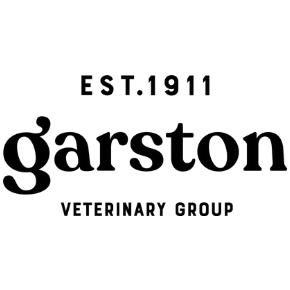
Seasonal surgery opening hoursChristmas Eve 24th December – Emergency team Christmas Day 25th December – Emergency team Boxing Day 26th December – Emergency team Wednesday 27th December – Normal opening hours Thursday 28th December – Normal opening hours Friday 29th December – Normal opening hours Saturday 30th December – Normal opening hours New Year’s Eve 31st December – Emergency team New Year’s Day 1st January – Emergency team Tuesday 2nd January – Normal opening hours Please remember to place food and repeat prescription orders by Wednesday 20th December 2023 Emergency CareAs a client of Garston Vets, you can feel confident that we are always available to deal with any pet emergency that may arise, day or night, including Christmas Day, Boxing Day and New Year’s Day. We are one of the few practices in Somerset & Wiltshire that operate our own out of hours emergency service on-site at our accredited small animal hospital at Garston House in Frome. Our hospital is staffed 24 hours a day, 7 days a week, looking after sick and injured patients or those requiring post-operative observational care – your pets are never left alone. It is the same cohesive team of vets and nurses that look after your animals out-of-hours as you will meet during the day at any of our practices. Our computerised patient records from all our surgeries are securely linked via internet servers, so we have access to all your pets’ clinical records whatever time of the day. If you have a pet emergency, please call us on 01373 452225 |
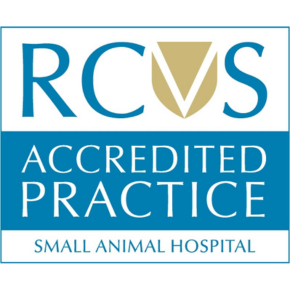
The Royal College of Veterinary Surgeons (RCVS) produced new guidelines on 1st September 2023 that state a veterinary surgeon must always perform a physical examination of an animal at the time of prescribing Prescription Only Veterinary (POM-V) Antiparasitic Medications.
Vets can however place a prescription for these medications within your animal’s computer records to allow further dispensings over a 12 month period without the need for repeat examinations.
Please ask your vet about an ongoing prescription if you have previously used veterinary prescription only antiparasiticides,or would like to discuss if they may be of use for your pet.
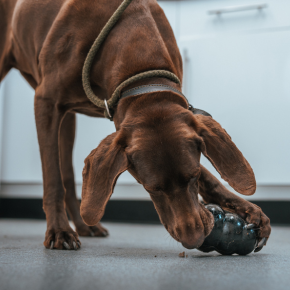
Ou nurse, Natalie, believes that it is never too early for pet owners to start preparing for the upcoming firework season. The bright lights and loud noises of fireworks can cause dogs and cats an unprecedented amount of stress. To minimise stress levels and to reduce the risk of injuring themselves during firework season, we recommend that you book an appointment to discuss what options are available to help.
Contact us about calming products in advance
There are many products available to help keep your household calm during firework season, however, as each animal is unique, so it is important to find out what will suit them best. Examples of these are:
- Calming supplements – These promote relaxation and come in various forms, such as dog chews, tablets and liquids. They tend to use ingredients thought to contain calming properties such as chamomile, valerian root and L-theanine.
- Thunder shirts – A vest that provides constant but gentle pressure to your dog’s body. This will have a calming effect, similar to a baby being swaddled.
- Pheromone diffusers – These release synthetic, man-made pheromones mimicking the natural calming pheromones released by dogs. These diffusers will help to reduce their anxiety levels during firework season.
- Prescription medication – There are a number of different medications that could be prescribed by our team. Anti-anxiety medication can medically help to reduce your dog’s anxiety by reducing the serotonin levels in their brain. There are either long-acting or short-acting options available and both will need to be dispensed and their dosage prescribed by a vet who has examined your pet.
As well as the products above, there are a number of different management techniques you can try at home to make firework season a little less stressful for everyone:
- Walk your dog during daylight hours and make sure they are snuggled up indoors when it goes dark.
- Create a safe space for your pet to hide when they’re feeling anxious. This could be a quiet corner of a room, away from a window and its essential they feel like they’re in control in this area. Once they take themselves to that area, do not interfere with your pet while they are in their safe space.
- Use their favourite toys/bedding/treats in this area so they start to associate positively with it and ensure they have access to it at all times.
- Muffle the sound of fireworks by shutting windows and black out the light flashes by drawing the curtains/blinds.
- Putting on the television or playing music in the background will help distract your dog – Classic FM’s pet classics is a hit for pets across the country, learn more about this here.
There are a number of different ways that owners can help their dogs during firework season, but our team of experienced vets can also advise and help when needed. Book an appointment with us at least 6 weeks before any planned events to give your pet the best chance at a calm firework season. Don’t forget that the consultation fee is included in our NEW Premium Wellness Plan membership.
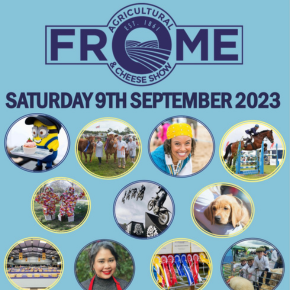
We are back at Frome Agricultural & Cheese Show for our 17th year. As always, our trade stand is situated opposite the dog show ring, you honestly can’t miss us!
Our tea and cake bar has become a firm favourite with show visitors and this year you can choose from raspberry & white chocolate muffins, fruit and nut flapjack, bread pudding and gingerbread biscuits to accompany your hot drink. Why not try our popular Garston travel mug deal and enjoy unlimited refills of tea, coffee or orange juice all day?
We also have a great selection of pet merchandise to purchase, along with our NEW harvest festival themed dog shop and tombola.
Fresh water and treats are available all day for our four-legged visitors, plus there’s always a vet on call should you need us in an emergency.
The Garston Dog Ring schedule will keep the crowds entertained all day, with lots of demonstrations and fun show classes from 9.30am – 5pm thanks to Charismatic Pets and M&M Gundogs.
Dog show class registrations start at 9am at our trade stand on show day. Each entry is £3.00, and every entrant receives a rosette with a prize for 1st place.
9.30-10.30am: Come and meet the behaviourist.
Come along and ask the behaviourist any questions you have relating to dog behaviour.
10.30-11am: Scent work demonstration
Pet dogs can do scent work too. Come and watch a searching demo to see how it’s done.
11-11.30am: M & M Gundog scurry demonstration
Watch Martin’s dogs find and retrieve a dummy in record time.
11.30-12pm: Most charismatic puppy (under 1 year)
Enter your gorgeous puppies. Any breed welcome must be under 1 year of age.
12-12.30pm: Most handsome gentleman (over 1 year)
Enter your handsome lads. Any age and breed welcome.
12.30-1pm: Prettiest lady (over 1 year)
Enter your prettiest girls. Any age and breed welcome.
1-1.30pm: ‘Have a go’ Hoopers and demonstration
Watch how Hoopers works with our demo and then have a go yourselves on a Hoopers course. Any age and breed welcome.
1.30-2pm: Dog Parkour demonstration
Feet on, feet in, unders, throughs and more. Come and see our parkour pups having fun!
2-2.30pm: M & M Gundog scurry demonstration
Watch Martin’s dogs find and retrieve a dummy in record time.
2.30-3pm: Most charismatic puppy (under 1 year)
Enter your gorgeous puppies. Any breed welcome must be under 1 year of age.
3-3.30pm: Most handsome gentleman (over 1 year)
Enter your handsome lads. Any age and breed welcome.
3.30-4pm: Prettiest lady (over 1 year)
Enter your prettiest girls. Any age and breed welcome.
4-5pm: ‘Have a go’ lure chase
Let your pooch have a go at chasing the lure around the luring course. The faster the better! Must be over 1 year. All breeds welcome.
All money raised will be donated to Move the Mind
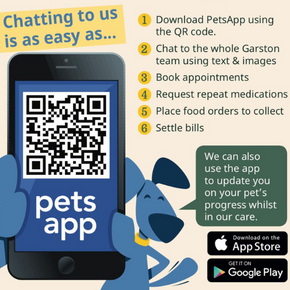
Chatting to our small animal team, booking appointments, requesting repeat medication and food orders, plus settling bills and keeping up to date with your pet’s progress while staying with us has just got a great deal easier.
PetsApp is our new online service that is keeping our phone lines free for more urgent calls. If you haven’t downloaded PetsApp already, you can do so:
By responding to our SMS invitations,
or
By clicking on the magic link https://petsapp.com/ml/ubgjLa2c2n9i3BEi9, selecting your usual Garston surgery, and creating your pet’s profile,
or
By using the PetsApp chat tab on our website in the bottom right-hand corner of our homepage.
Once you have a PetsApp account the whole family can use the same log-in to contact us about your pet.
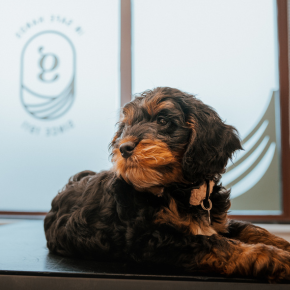
The school holidays are here and for many of you, that may mean having a new furry friend joining your family! If you do plan on investing in a puppy or kitten this summer, read our short guide below on why this is an ideal time and how best to prepare for this exciting change.
Remember to contact our team to register your new pet and book their vaccinations, weigh-in & parasite prevention appointments, or you can start this process on our website – register your pet online
We also have a helpful guide on what to look out for when buying a new puppy or kitten – download it here.
Tips for purchasing a new Puppy or Kitten
Why the school summer holidays are ideal
We typically see an uplift in new puppy and kitten registrations during July and August – good reasons for this include:
- You may have an extended period of time at home (depending on your profession and family setup) meaning you’ll have more time to properly care for, train, and socialise a young pet. Remember to ensure they get used to spending time alone though to reduce separation issues down the line.
- If you have children, they can be more involved with the early stages of your new pet’s development and acclimation to your home during the 6-week school summer holidays – the perfect time to teach them about pet care responsibilities!
How to prepare your home for a new pet
1. Pet-proof your home
Puppies and kittens are curious and love to explore their environment, so it’s important to make your home safe for them. This may include removing any hazardous items, securing loose electrical cords, and ensuring that all cleaning chemicals and medications are safely locked away. You may also want to install a stair gate to ensure your puppy’s safety. It is wise to check your garden too for hazards, including poisonous plants as young pets like to explore with their mouths.
2. Purchase supplies
Before bringing your new pet home, make sure you have all the necessary supplies such as food & water bowls, a collar, lead, a pet crate, bedding, toys and food suitable for a puppy/kitten. Talk to the breeder and try to stick with the same brand of food they were feeding the litter to minimise the risk of tummy upsets. Stock up on puppy/kitten treats and register your new pet with us at Garston Vets.
3. Plan for toilet training
Toilet training is an important part of your new pet’s early training, so plan ahead for this. Decide on a designated area in your garden (or home for litter trays) and establish a consistent schedule for potty breaks. It’s also worth investing in puppy/kitten training pads to use in your house in case of accidents!
4. Make arrangements for your absence
Puppies and kittens require a lot of attention and care when they’re young. If you’re going to be away during the day, make arrangements for someone to take care of your pet or consider using a dog day care service for puppies or a pet sitter at your home. Our team at Garston Vets will be able to advise on local pet sitters/walkers in Wiltshire and Somerset for you.
5. Research training techniques
Start researching training techniques and consider enrolling your puppy in a regular training class. This will help to socialise your puppy and you will both learn basic obedience commands. You can actually train cats to respond to some commands too!
6. Prepare your family
Getting a new pet is an exciting time, but it’s important to prepare your family, especially children, for the responsibilities that come with owning one. Teach them about the importance of gentle handling, proper feeding and exercise, and encourage them to be part of your pet’s daily care. By following these tips, you’ll be well-prepared to welcome your new furry friend into your home during the school holidays. Remember, patience and consistency are key to successful ownership and don’t forget to register your pet with Garston Veterinary Group.
7. Attend a Garston Puppy Clinic
Why not come along to one of our Puppy Clinics presented by Charis Vincent from Charismatic Pets Dog Behaviour & Training Centre, Warminster for advice on:
The sessions are open to both current and new clients, from pre-purchase to owners with puppies up to the age of 18 weeks.
Puppy Clinics are held at our Westbury Surgery on a Monday evening. Please ask at reception for the next available session.
Attendance is £10 per client or £5 if on a Garston Wellness Plan.
This event is for ‘hoomans’ only, but every attendee will receive a special goody bag to take home to their pup!
Download and share our guide on the do’s and don’ts of buying a new puppy or kitten this summer.
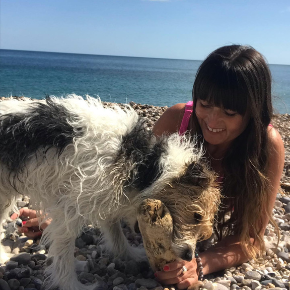
Our nurse, Gemma understands how exciting it can be taking your furry friend on a UK holiday. However, it’s important to keep in mind that dogs have specific needs and require proper care and attention to stay safe this summer. Gemma has put together some essential tips to help you keep your dog happy whilst on holiday in the UK.
We’ve also got an invaluable guide on how to improve your dog’s travel sickness woes here:
Download our holiday travel sickness guide
Dog Friendly Holiday Checklist
Pack essentials
When packing for your UK holiday, make sure to pack your dog’s essentials. This includes food, water, treats, and any medication your dog requires. You should also bring a lead, poo bags, and their favourite toys to keep them entertained.
Research dog-friendly accommodations
Before booking your accommodation, research what dog-friendly options are available. Many hotels, cottages and campsites in the UK are dog-friendly, but it’s important to check the rules and regulations beforehand. Some accommodations may have restrictions on the size or breed of the dog, while others may charge an additional fee. Ask friends and family what dog-friendly accommodation they know of and our team of animal lovers may also have some recommendations!
Exercise regularly
Dogs require regular exercise to stay healthy and happy. When on a UK holiday, make sure to take your dog for daily walks or runs to keep them active. You can also explore dog-friendly beaches or parks to give your dog more space to run and play. Head Vet Andy also recommends, depending on the length of your commute, stopping to let your dog stretch their legs and go to the toilet. Going on a UK holiday is usually a much longer journey than what your pet is used to so breaking it up can help keep them comfortable whilst travelling.
Provide adequate rest
While it’s essential to keep your dog active, it’s equally important to provide adequate rest. Dogs require proper sleep to stay healthy and happy, so make sure to provide them with a comfortable place to sleep. Andy recommends taking familiar blankets and if you can squeeze it in, take their usual bed to make sure your dog is comfortable for the duration of your stay.
Keep them hydrated
Make sure your dog has access to clean and fresh water at all times. This is especially important during hot weather, as dogs can become dehydrated quickly. Carry a water bottle and portable bowl with you when out and about to ensure your dog stays hydrated. Andy also wants owners to remember to not walk their dogs during the hottest part of the day on Summer holidays.
Follow local rules and regulations
When on a UK holiday with your dog, it’s important to follow local rules and regulations. Many public places such as beaches and parks have specific rules for dogs, such as requiring them to be on a lead, only allowing them access during certain months or limiting the number of dogs per person.
In conclusion, keeping your dog healthy and happy on a UK holiday requires proper planning and preparation. With these tips, you can ensure that your furry friend has a happy and healthy holiday alongside you. If you know somebody who is planning a UK holiday with their dog, share this article with them.
Don’t forget to download our travel sickness guide for dogs to ensure your staycation commute goes smoothly for both you and your pet!
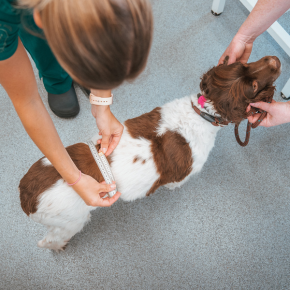
Obesity is one of the most common nutritional disorders in our pets today. Approximately 6 in 10 cats and dogs are overweight.
Just as in humans, weight gain most commonly occurs when there is an excess calorie intake that does not match the animal’s level of physical activity. Many things can contribute to weight gain including age, mobility, food type, and neuter status. It is important to recognise that although these factors increase the risk of weight gain, it is avoidable as long as we are aware of the presence of these risks.
What are the risks to my pet if they are overweight?
Animals who are overweight have a reduced life-expectancy and will have an increased risk of the following conditions:
- Arthritis
- Diabetes mellitus
- Heart disease
- High blood pressure
- Breathing difficulties and snoring
- Heat stress
- Pancreatitis
Many other significant conditions can be exacerbated by excess body weight, and animals that are overweight will have a significantly increased anaesthetic risk no matter what surgery they require.
How do I know if my pet is overweight?
Hopefully you will have already made you initial free weight clinic appointment with one of our nursing team. If you haven’t please do so as soon as possible. We have lots of experience with weight management are are here to give you as much advice and support as possible.
What can I do to prepare for the appointment?
- With the aid of our nurses we hope that you will soon start to see visible signs of weight loss in your pet. To do this we to start off on the correct foot. Please follow the next few steps so that your first appointment is effective as possible.
- Talk to all family members and other carers of your pet. You need to explain to them for health reasons your pet will begin a weight loss program. If everyone is on board at the start it should avoid frustration and confusion.
- Please complete a food diary for your pet for at least one week. Absolutely everything needs recording, from their normal daily meal, to every last table scrap or treat that they get given. Please be as honest as possible, as having a completely accurate record makes it easier for our Nurses to formulate a diet plan for your pet. Ensure you bring this with you to your appointment.
- Please either provide photos or bring your pet’s food packaging in with you to the appointment. Every food is formulated differently and the information on the back of the packet provides us with the nutritional information we need to devise a correct feed guide for your pet.
What happens at the initial consultation?
We do ask that you bring your pet along to all weight clinics.
During the free initial weight clinic:
- Your pet will be weighed and have various body measurements taken and recorded.
- The nurse will take several photographs of your dog for the records.
- The nurse will then spend time discussing your pet’s food diary and daily exercise regime with you.
- We will then discuss with you various options regarding diet and treats to allow us to tailor an individual and realistic diet and exercise plan for your pet.
- We will also provide your pet with their own weight management booklet to help support you through their weight loss experience.
At the end of the consultation our aim is to have helped you formulate a plan for your pets weight loss, diet changes, and exercise regime, we will also arrange an appointment for your pets next check.
We are offering 25% off all Royal Canin Weight Management Satiety diets in July, with a further 20% off for Wellness Plan members. Please click here or speak to a member of a team to find out more about our Weight Management Clinics and offers.
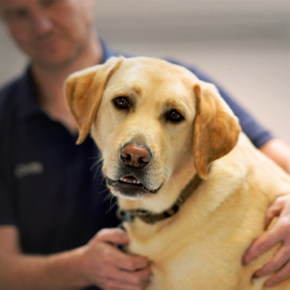
Spring is here, and for many of us, that means warmer Somerset & Wiltshire weather, blooming flowers, and spending more time outdoors with our furry companions. However, for dogs, spring can also mean the development or flare-up of allergies…
Dog allergy symptoms to be aware of
Did you know that dogs can be allergic to a variety of things just like humans, including tree and grass pollens, insect and flea bites, dust, and mould. These allergens can be particularly prevalent during the spring. Our veterinary team have put together a handy Dog Allergy Guide to help you get to know the symptoms of allergies to look out for.
Download our Dog Allergy Guide
Spring/summer environmental dog allergies [H3] Hay fever in dogs
Pollen allergies from trees, grass, flowers, and weeds can start in spring and last until autumn for some dogs. All dogs can suffer from pollen allergies (or hay fever) however, it seems to be more common in females and some breeds can be more prone to it, like Labrador Retrievers, Golden Retrievers, Dalmatians, and West Highland Terriers.
With airborne allergens, like pollen, dogs can have symptoms even when they’re nowhere near the source I.e., on the grass. Whereas some dogs may sneeze due to pollen allergies, there are many other more common symptoms to look out for – learn more here.
Mould allergies
Mould allergies can also affect dogs more when spring arrives, particularly in areas with high humidity; house mould should be dealt with as soon as possible.
Dust allergies
Dust allergies can lead to sneezing, breathing difficulties, and other common allergy symptoms
We’ve mentioned this as a ‘spring allergen’ as although it can occur at any time, ‘spring cleaning’ can disturb large amounts of dust and debris.
Flea bites
A whopping 95% of flea eggs, larvae and pupae live in the environment, not on pets. As the temperature warms up in spring, flea activity starts to ramp up. Some dogs are allergic to flea saliva and may have an immediate (within 15 minutes) or a delayed (24 – 48 hours) reaction that is most visible on the skin. If your dog has atopic dermatitis, they will be more prone to a flea saliva allergy.
Atopic dermatitis is a common condition that causes chronic itching, which leads to excessive scratching, biting or licking at the skin, resulting in inflammation of the skin and hair loss. This condition can be caused by an allergic reaction to environmental allergens, such as those above.
What to do if you think your dog is allergic?
If your dog is showing signs of allergies, it’s best to book an appointment with one of our vets. They can determine the cause of your dog’s symptoms and recommend an appropriate course of treatment. In some cases, they may recommend antihistamines or other medications to help control your dog’s symptoms. In more severe cases, they may also recommend an anti-allergy vaccination or topical medications to relieve the symptoms.
IMPORTANT: Never give your dog medication meant for humans, particularly antihistamines, without a vet’s explicit advice and dosage instructions. Some brands may contain harmful ingredients for pets and the dosage may not be the same as it is for humans. It’s also important to keep in mind that while spring is a common time for allergies to surface, dogs can develop allergies or have allergic reactions all year round.
Other reasons why your dog might be scratching
We think that it’s important to understand there may be other reasons for your dog’s scratching and irritation such as:
- Food intolerances
- Dry skin (from a lack of essential fatty acids in the diet, cold weather, or grooming products)
- Over-production of skin yeast or bacteria
- Skin infection
- Mites or lice
- A tick bite
- Behavioural issues such as anxiety or boredom
This is why knowing the other common symptoms of allergies and booking an allergy appointment for your dog is important. The sooner our team can investigate and diagnose, the sooner a treatment plan can be started and you dog’s daily life improved.


